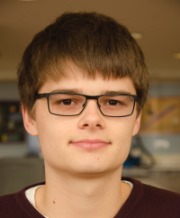MEng Nuclear Engineering, School of Metallurgy and Materials
"T he School of Metallurgy and Materials is one of the friendliest and supportive departments I have ever experienced. They went above and beyond my expectations by supporting me when I travelled to Princeton University in the USA to work on fusion technology and travelled to Xiamen University in China to study at a clean energy summer school."
he School of Metallurgy and Materials is one of the friendliest and supportive departments I have ever experienced. They went above and beyond my expectations by supporting me when I travelled to Princeton University in the USA to work on fusion technology and travelled to Xiamen University in China to study at a clean energy summer school."
Why did you originally apply to do your chosen course at Birmingham?
When I was deciding on what degree to study at university, I was studying basic nuclear physics in my physics A Level and it was also around the time of the nuclear Fukushima accident which occurred in Japan. I became interested in nuclear energy, safety and physics, and I knew the nuclear industry was the place for me. I applied to the MEng Nuclear Engineering programme because of its innovative and long history in nuclear energy and the degree is highly sought-after in the industry.
What do you think are the best points of your course?
I think the best points are the wide range of subjects taught in the degree that are all relevant to the nuclear industry. Some examples are: physics, mathematics, statistical phyiscs, and nuclear physics, all play a large role when it comes to the fourth year and studying nuclear reactor kinetics and radiation transport (both are important in nuclear power); material science, degradation of alloys, and irradation material science, all prepare you for vast materials challenges. These all tie together when applying to graduate careers in the industry, as you will be well aware of the biggest issues facing the industry. In addition, the course also prepares you for further study for a PhD in science or engineering.
What’s the best thing about studying at the University of Birmingham?
One of the great things is the wide and diverse range of student societies - there is probably a society for nearly anything you wish for and if there isn't, you can always create one yourself! In fact, there is a Nuclear Society (NucSoc) which is organised by students on the nuclear courses, that provides the ideal social platform for all the years to get to know each other.
What’s your highlight of your time at the University?
My highlight would be working for 3 months as a Nuclear Design Engineer Intern at Hitachi-GE Nuclear Energy Ltd in Japan (Hitachi-GE are designing the new nuclear reactors that will be built in Anglesey, North Wales). My main role was to modify the reactor designs to meet the UK nuclear regulator's approval. If it was not for the support from the University of Birmingham, I could not have been able to travel to Japan and undertake this internship.
What advice would you give to students thinking about studying on the course?
My advice would be: do not worry about not knowing what you want to do after university - I only knew I wanted to work within the nuclear field but nothing more specific than that. The course gives you a great perspective of what is out there in the field, but do not forget the course also gives you the skills required for most graduate careers (engineering, finance, scientific research, business etc). I only decided in my third year what I wanted to do after university, and this is to continue onto further study through a PhD in nuclear physics.
Is there anything extra students thinking about studying on the course should know?
The School of Metallurgy and Materials is one of the friendliest and supportive departments I have ever experienced. They went above and beyond my expectations by supporting me when I travelled to Princeton University in the USA to work on fusion technology and travelled to Xiamen University in China to study at a clean energy summer school. When thinking about studying on the nuclear courses, the message to take away from this is that the department truly invests into your future through the academic staff's direct help and support.